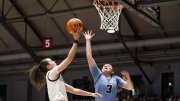Last September, the members of the Harvard women’s basketball team stood in their locker room, anticipating a painful exercise. This wasn’t a drill or conditioning test; it was a ritual for the path ahead. Each player had to set an intention and then snap a toy arrow wedged between her neck and the wall. The activity was a metaphor, Delaney-Smith coach Carrie Moore explained, to “think about something that you want to overcome or a mental obstacle that you want to overcome.” Five months later, those hurdles have become concrete. Despite a talented, experienced roster, Harvard (17-3 overall, 6-2 Ivy) has made mental errors that led to losses to Columbia and Princeton. Now it finds itself in third place behind the Lions and Tigers for the third straight year. Ahead of Sunday’s rematch with Columbia, how is Moore resetting her team?
Despite losing to the Lions in Ivy Madness last March, the Crimson felt buoyant entering the offseason. Harvard returned a veteran core led by senior guards Harmoni Turner and Elena Rodriguez. Paired with an athletic first-year class, this would give the Crimson the depth to deploy their full-court press for entire games. Then again, having a large, versatile roster heightened expectations, and the coach wanted to focus less on the goal of winning a championship and instead prioritize the steps to get there. She hired a mental performance coach who conducts team-building activities (like the arrow exercise) and works with players individually. “If we can get over that mental hump,” Moore said, “I think there’s not too many teams that can beat us.”
In November, after opening the season with a win over the University of Massachusetts, the Crimson demonstrated newfound poise at then-25th-ranked Indiana. The Hoosiers held a late-fourth quarter lead, but first-year guard Alayna Rocco swished a three with 20 seconds remaining to force overtime. Harvard won 72-68. Then the Crimson lost badly at Quinnipiac before winning their final nine non-conference games. The stretch showcased Harvard’s defense (the Crimson allow 51.9 points per contest, which ranks first in the country), anchored by guard Gabby Anderson ’26, whose versatility and energy jumpstart the full-court press.
When Ivy League play began in January, Moore cautioned her team not to put too much stock in their early-season wins; in the conference, she emphasized, their record was 0-0. The warning proved prescient. After dispatching Yale 61-43, Harvard lost at Princeton 52-50 on a buzzer-beater. Against the Tigers, Harvard made just one of 15 three-point attempts, depended too heavily on Turner and Rodriguez (who combined for 37 points), and struggled to pressure the Tigers on defense. Although Princeton is younger this year, the mental block against the six-time defending Ivy champions remained. Moore observed: “It still says Princeton across their chest.”
After that loss, the coach held a scrimmage in which neither Turner nor Rodriguez were allowed to score and began having each player make 1,000 shots weekly outside of practice. This led to more balanced offense and improved shooting, and blowout wins against Brown, Penn, and Yale set up a showdown with first-place Columbia on January 31.
Harvard lost 80-71. The Crimson may have started with less energy than usual because they held off on pressing the Lions (an explosive offensive team) early in the game. Nevertheless, when Harvard did press, Columbia repeatedly lofted baseball passes—one-handed, overhand throws—over the defense. In addition, Harvard had turnovers after dribbling into traps in the Lions’ press. “Against them,” Moore said, “we just don’t play smart enough.”
After the Crimson defeated Cornell 72-60 the next night, Moore led the team through a “truth-telling week.” It began with a 6:45 a.m. Monday practice designed to simulate the difficulty and stress players experience in intense games. “The better teams,” Moore explained, “can really put all of that aside and stick to the process.” On that Wednesday, Harvard had a two-hour “culture talk,” during which players were encouraged to share constructive criticism in pairs. According to Rodriguez, who worked with Turner, “It is really helpful because you see how your teammates really see you, and they understand your game.” The feedback got through: following workouts on Thursday and Friday, the Crimson throttled Dartmouth 66-31 last Saturday, February 8 .
This weekend, after playing at Cornell on Friday, the Crimson travel to Columbia on Sunday. Moore planned to show film from the earlier loss to the Lions, as well as drill her players in defense and press offense. Those drills, she said would include male practice players, assistant coaches, or loud music to simulate what Columbia’s aggressive defense might feel like in their boisterous gym. Staying composed will be imperative, because against good teams like the Lions, small mistakes can mushroom. At the same time, Harvard has to communicate on defense and seek out situations on offense where Crimson players can go up against defenders with less size, speed, or skill. These are the kinds of smart plays that add up to wins. “It’s a game of inches,” Moore emphasized. “When talent meets talent against the good teams in our league…what are the difference makers? What are the things that are going to get us over the top?”
The Crimson and Lions tipoff on February 16 at noon on ESPNU.









